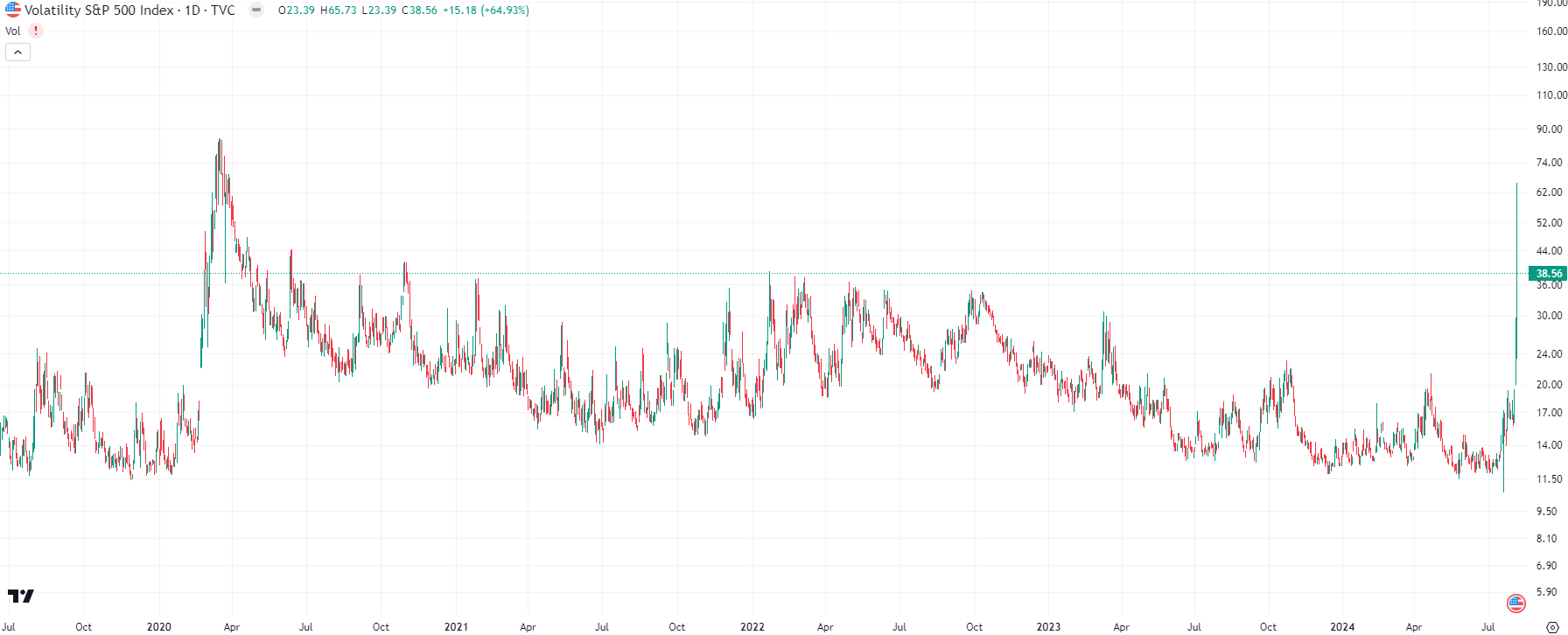What is the VIX and what are the factors that cause it to violently surge and go into tailspins?
![]() Nick Sundich, August 9, 2024
Nick Sundich, August 9, 2024
You may hear the occasional passing comment that the market is volatile, but the VIX Index (also known as the Volatility Index) is one way to make that comment visible. And the fact that the S&P 500 Index is currently at levels not seen since the Corona Crash, indicates how volatile the market is.
What is the VIX Index?
The VIX index, also known as the fear index, is a measure of market volatility and investor sentiment. The VIX index was created by the Chicago Board Options Exchange (CBOE) in 1993 and has become increasingly popular in the financial industry. It is now a widely watched benchmark that provides important information for market participants, particularly during periods of market turbulence. How can you say ‘markets are volatile’? When the VIX Index is high. There is not a specific level at which markets are volatile, although when it is at highs not seen in multiple years, you can tell markets are unusually volatile. And so they have been during early August 2024 as investors fear a US recession, having believed a ‘soft landing’ was a fait accompli for the best part of 9 months.
How is the VIX Index calculated?
It is derived from the prices of index options – whether the ASX 200 or the S&P 500 or another – and is used as an indicator of the level of fear or uncertainty in the market. The higher the VIX, the greater the level of fear and uncertainty among investors.
The VIX index has been used as a tool for predicting the direction of the stock market. Historically, spikes in the VIX have often been followed by stock market crashes or sell-offs.
If we take a look at the S&P500 VIX Index over the last five years, we can see the highest it has been was during the Corona Crash. That period aside, the highest it has been in five years was in the first half of 2022 when Russia invaded Ukraine and the following 6 months or so. In both instances, investors were uncertain about what was to come and which sectors would gain.

S&P500 VIX Index over the last 5 years to August 6 2024, log scale (Source: TradingView)
So how useful is it?
The VIX index has proven to be a reliable predictor of market crashes, as high volatility tends to precede major market downturns. Going further back in time, the index surged to over 80 during the 2008 financial crisis when the stock market saw one of the steepest declines in history. This highlights how the VIX index can provide meaningful insights into market behaviour and assist investors in making informed decisions.Moreover, while the VIX index is widely used by equity traders and investors, it also has practical applications in other financial markets. It can be particularly useful in the options market, where it is used to price options contracts and assess the potential risks associated with different strategies.
The VIX won’t tell you how individual sectors or stocks are doing
Nonetheless, it does not tell investors how individual sectors may perform. Some sectors may defy the market. For instance, energy stocks defied the market during the Ukraine war given the pressure on supply chains. Also, tech stocks performed substantially worse than the rest of the market during that time period.
And as with any other metric used to judge the state of the market generally, it should not be the sole factor on which you make investment decisions. Even if the decision is about an ETF related to the individual indice, traders should still do their own research.
Look at other factors as well
In summary, the VIX index is a measure of market volatility and investor sentiment that is derived from S&P 500 index options. It is an important tool for predicting market changes and is closely watched by investors and financial professionals alike. However, as with any other tool, it is no good on its own – it needs to be used in conjunction with several others.
What are the Best ASX Stocks to invest in right now?
Check our buy/sell tips
Blog Categories
Get Our Top 5 ASX Stocks for FY25
Recent Posts
The $3m super tax is coming! If you’re invested in equities, here is how it might impact you
It seems during the next 3 years, the $3m super tax will be officially a thing. Itwas blocked by the…
Northern Star Resources (ASX:NST): The $28bn gold miner that stands above them all
Northern Star Resources (ASX:NST) is by far the largest gold company on the ASX, capped at $28bn as of May…
6 ASX stocks you forgot were listed
Here are 6 ASX stocks you forgot were listed Brisbane Broncos (ASX:BBL) No it is not a mistake. This…



